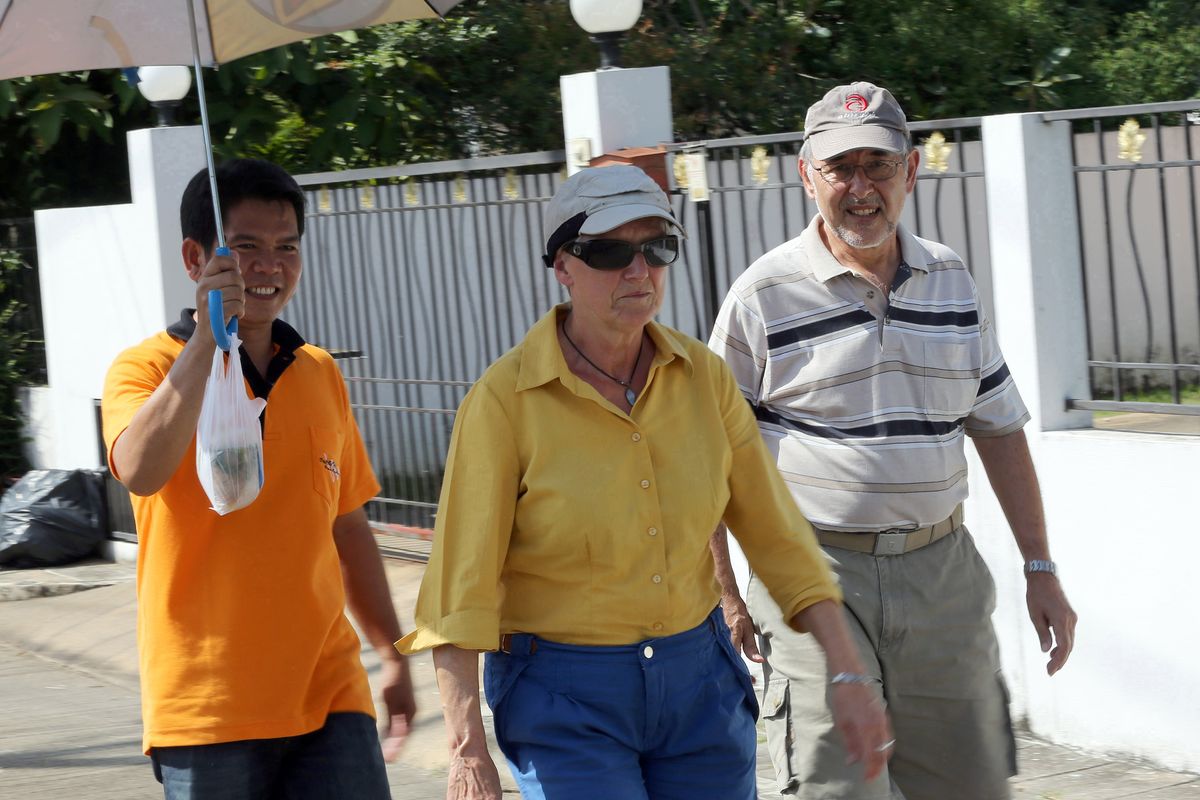Thailand emerging as Alzheimer’s care leader

CHIANG MAI, Thailand – Residents of this facility for people with Alzheimer’s disease toss around a yellow ball and laugh under a cascade with their caregivers, in a swimming pool ringed by palm trees and wind chimes. Susanna Kuratli, once a painter of delicate oils, swims a lap and smiles.
Watching is her husband, Ulrich, who has a heart-rending decision: to leave his wife of 41 years in this facility 5,600 miles from home, or to bring her back to Switzerland.
Their homeland treats the elderly as well as any nation on Earth, but Ulrich Kuratli said the care here is not only less expensive but more personal. In Switzerland, “You have a cold, old lady who gives you pills and tells you to go to bed,” he said.
Kuratli and his family have given themselves six months to decide while the retired software developer lives alongside his 65-year-old wife in Baan Kamlangchay – “Home for Care from the Heart.” Patients live in individual houses within a Thai community, are taken to local markets, temples and restaurants, and receive personal around-the-clock care. The monthly $3,800 cost is a third of what basic institutional care would come to in Switzerland.
Kuratli is not yet sure how he’ll care for Susanna, who used to produce a popular annual calendar of her paintings. But he’s leaning toward keeping her in Thailand.
“Sometimes I am jealous. My wife won’t take my hand but when her Thai carer takes it, she is calm. She seems to be happy,” he said. “When she sees me she starts to cry. Maybe she remembers how we were and understands, but can no longer find the words.”
Relatives in Western nations are increasingly confronting Kuratli’s dilemma as the number of Alzheimer’s patients and costs rise, and the supply of qualified nurses and facilities struggles to keep up. Faraway countries are offering cheaper, and to some minds better, care for those suffering from the irreversible loss of memory.
The nascent trend is unnerving to some experts who say uprooting people with Alzheimer’s will add to their sense of displacement and anxiety, though others say quality of care is more important than location. There’s also some general uneasiness over the idea of sending ailing elderly people abroad: The German press has branded it “gerontological colonialism.”
Germany is already sending several thousand sufferers, as well as the aged and otherwise ill, to Eastern Europe, Spain, Greece and Ukraine. Patients are even moving from Switzerland, which was ranked No. 1 in health care for the elderly this year in an index compiled by the elderly advocacy group HelpAge International and the U.N. Population Fund.
The Philippines is offering Americans care for $1,500 to $3,500 a month, well below U.S. rates. About 100 Americans are currently seeking care in the Philippines, said J.J. Reyes, who is planning a retirement community near Manila.
Facilities in Thailand also are preparing to attract more Alzheimer’s sufferers. In Chiang Mai, a pleasant city ringed by mountains, Baan Kamlangchay will be followed by a $10 million, holiday-like home scheduled to open before mid-2014. Also on the way is a small Alzheimer’s unit within a retirement community set on the grounds of a former four-star resort.
A number of European countries have generous national health insurance, but these generally do not cover treatment abroad. Kuratli said the Swiss government would cover two-thirds of the bill for his wife’s care if she stays in Switzerland, but since high-end private clinics there can cost $15,000 or more per month, he could still end up paying more there than he would in Thailand.
Baan Kamlangchay was established by Martin Woodtli, a Swiss who spent four years in Thailand with the aid group Doctors Without Borders before returning home to care for his Alzheimer’s-diagnosed mother.
He brought his mother to Chiang Mai, where she became the home’s first “guest.” Woodtli never uses the word “patient.”
Over the next 10 years, the 52-year-old psychologist and social worker purchased or rented eight houses where 13 Swiss and German patients now reside.
Angela Lunde of the U.S.-based Mayo Clinic said that generally the afflicted do better in a familiar environment, but over time, even those with advanced stages of the disease can adjust well. “I think a positive transition has less to do with the move itself and more with the way in which the staff and new environment accommodates the person living with dementia,” she said.